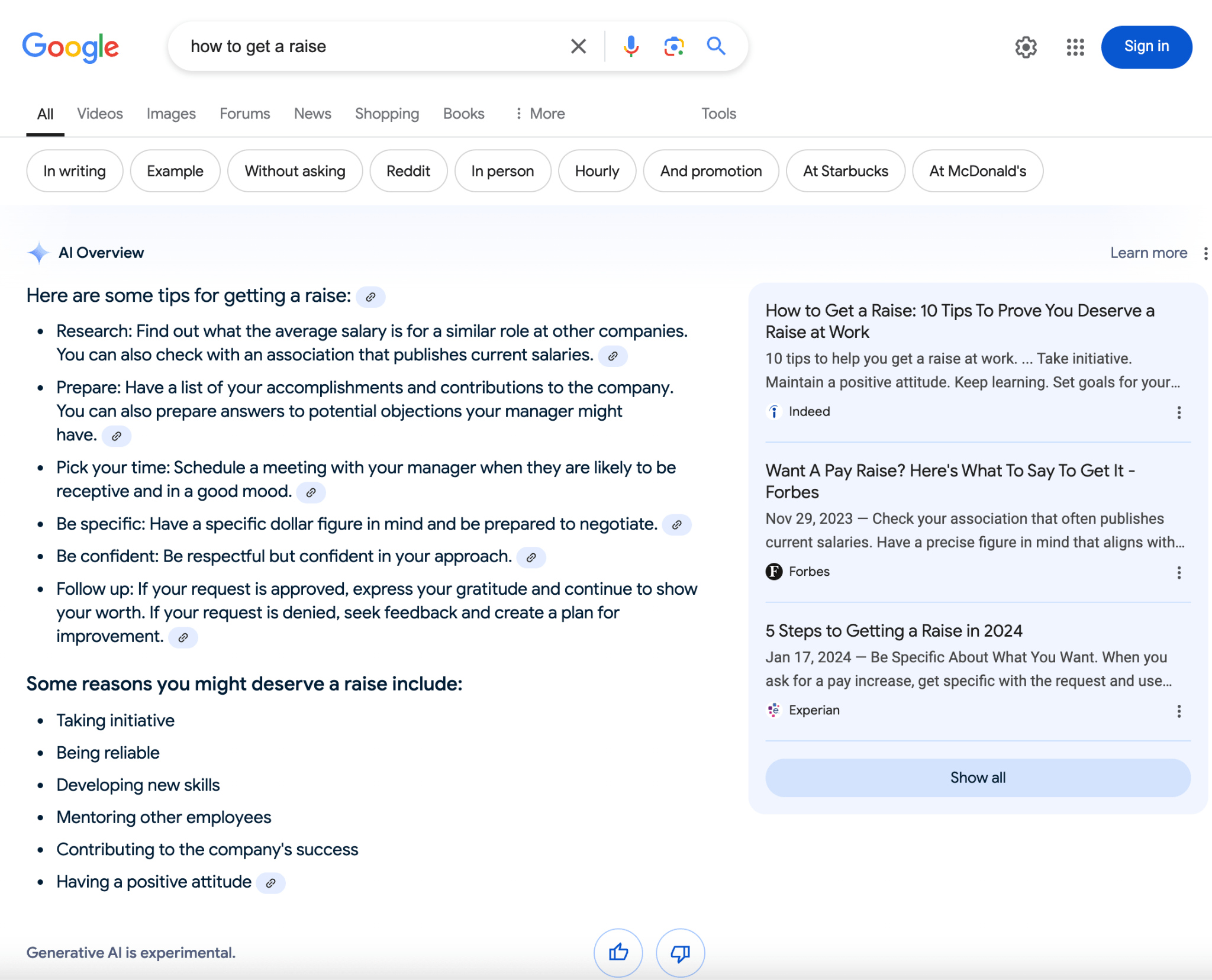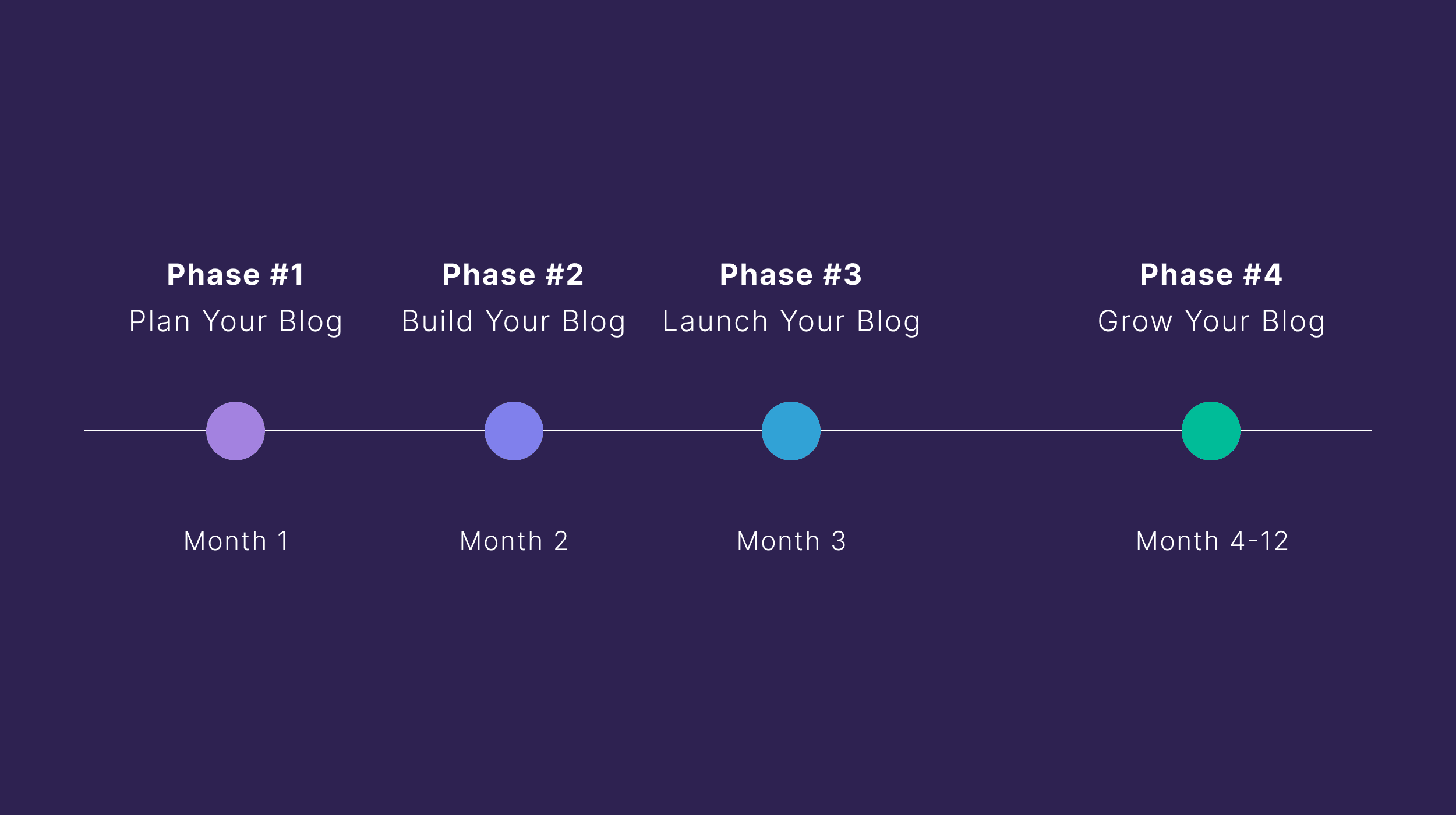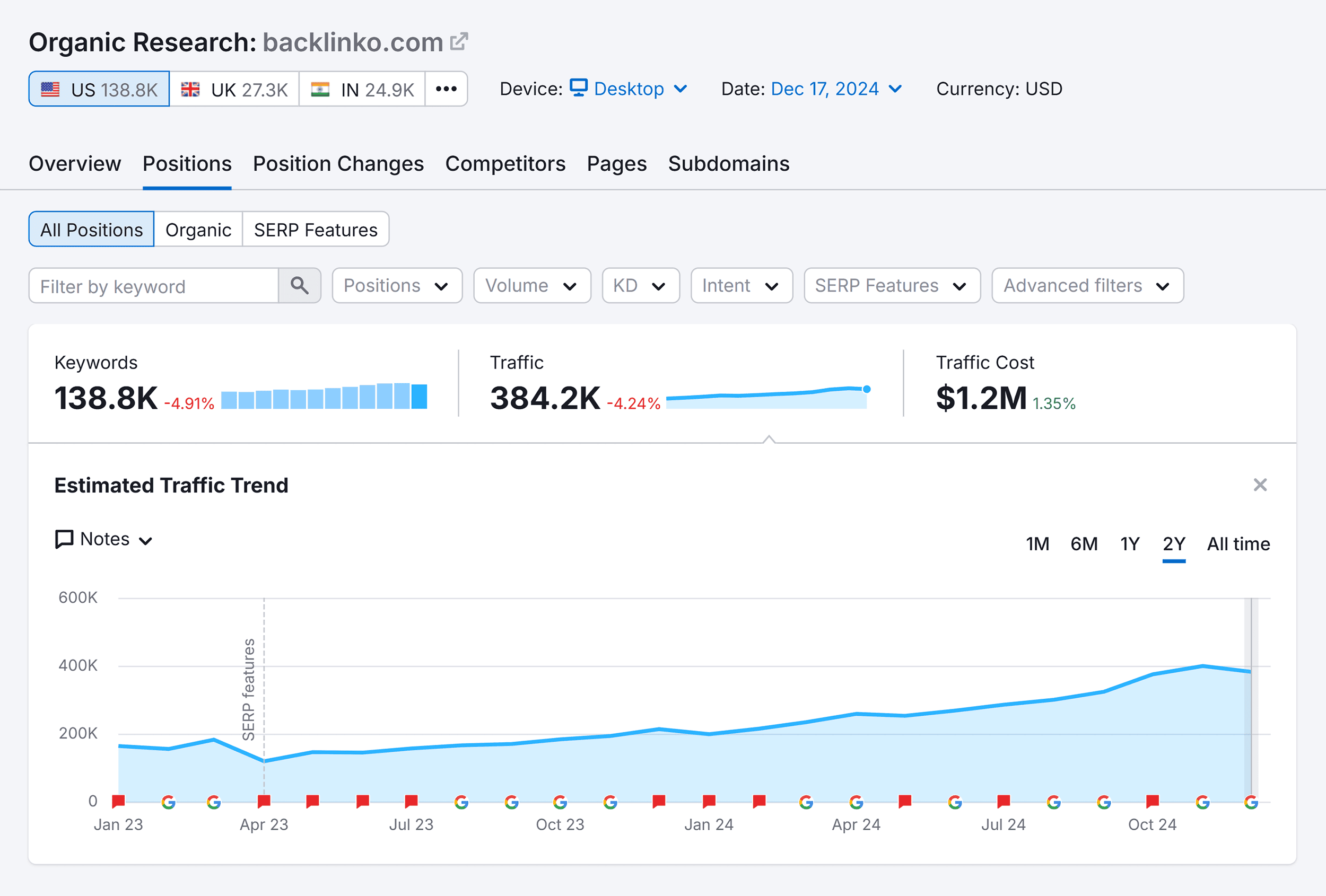Google officially launched AI Overviews in the U.S. on May 14, 2024. Three months later, they announced that AI Overviews was rolled out to six more countries: the UK, India, Japan, Indonesia, Mexico, and Brazil.
Is SEO dead and should you panic? Or is everything a big hoo-ha and there’s nothing to worry about?
Here’s everything we know about Google’s AI Overviews to date:
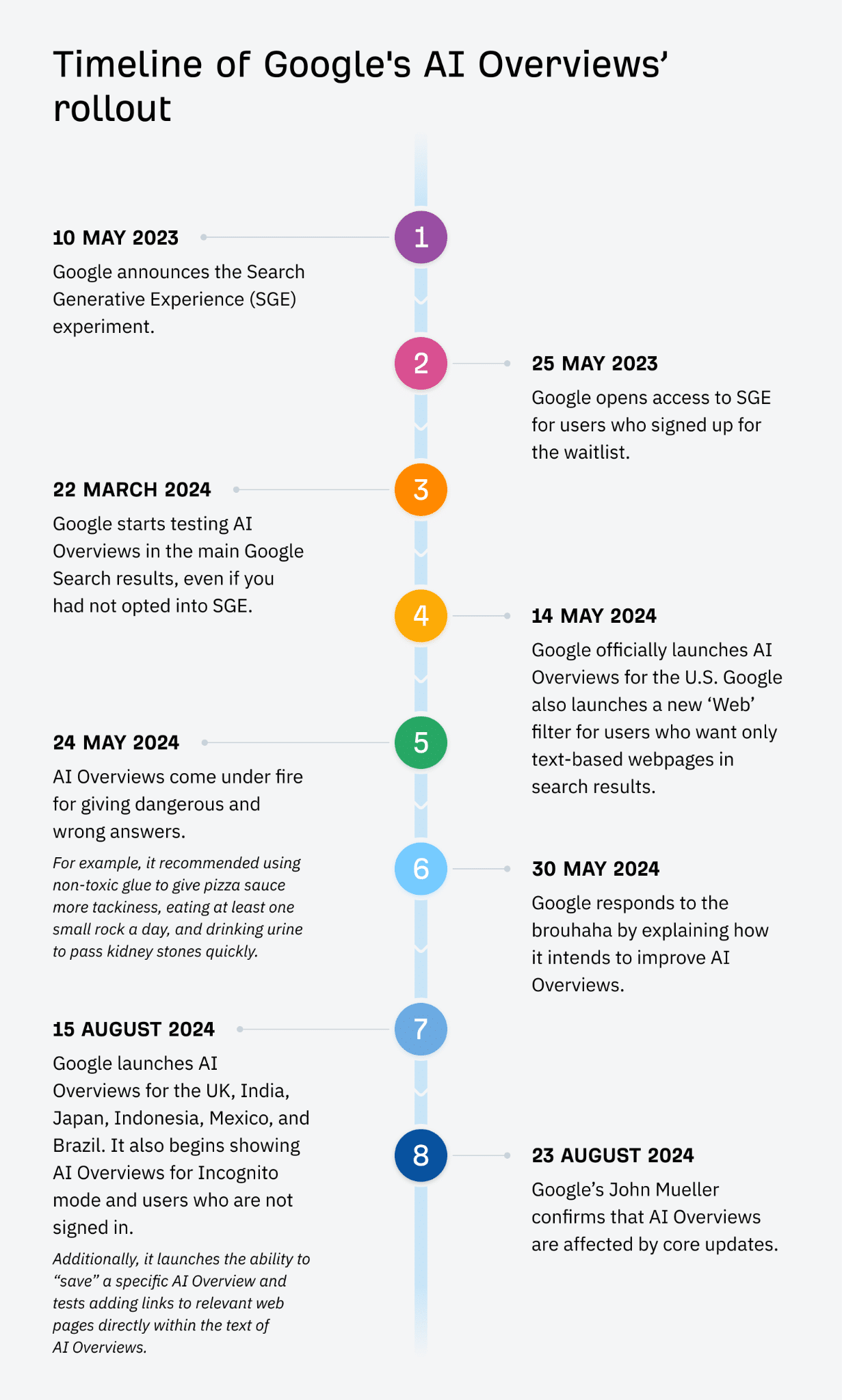
- 10 May 2023 — Google announces the Search Generative Experience (SGE) experiment
- 25 May 2023 — Google opens access to SGE for users who signed up for the waitlist.
- 22 March 2024 — Google starts testing AI Overviews in the main Google Search results, even if you had not opted into SGE.
- 14 May 2024 — Google officially launches AI Overviews for the U.S. Google also launches a new ‘Web’ filter for users who want only text-based webpages in search results.
- 24 May 2024 — AI Overviews come under fire for giving dangerous and wrong answers. For example, it recommended using non-toxic glue to give pizza sauce more tackiness, eating at least one small rock a day, and drinking urine to pass kidney stones quickly.
- 30 May 2024 — Google responds to the brouhaha by explaining how it intends to improve AI Overviews.
- 15 Aug 2024 — Google launches AI Overviews for the UK, India, Japan, Indonesia, Mexico, and Brazil. It also begins showing AI Overviews for Incognito mode and users who are not signed in. Additionally, it launches the ability to “save” a specific AI Overview and tests adding links to relevant web pages directly within the text of AI Overviews.
- 23 Aug 2024 — Google’s John Mueller confirms that AI Overviews are affected by core updates.
In September 2023, Google filed a patent for their AI Overview called “Generative summaries for search results”.
Thanks to Rich Sanger, who looked at the patent, we have an idea of how Google’s AI Overviews work:
- Query submission: You enter a search query.
- Understanding the query: Google uses a variety of LLMs to understand the context and intent of your query.
- Gathering content: The system retrieves relevant documents, including web pages, articles, images, and videos related to your query.
- Processing additional content: In addition to the immediate search results, Google considers content from related searches and information others found helpful under similar query circumstances.
- Generating a summary: An LLM combines all this information to generate a helpful response to your query.
- Dynamic and context-aware responses: The AI adapts its responses based on the specific context of each query submission. If queries are repeated or similar in different contexts, the AI adjusts the summaries it provides.
- User interaction and learning: Google learns from how users interact with the search results. If certain responses are consistently overlooked in favor of others, or if user clicks suggest a preference, the AI modifies future responses to align more closely with user behavior.
- Enhancing accuracy and relevance: The AI continually updates its understanding based on new information and interactions, which helps it to provide more accurate and contextually relevant responses over time.
The most important question, at least for SEOs, is how the system selects the sources. There are three main criteria:
- Query-dependent measures: The system assesses how relevant each potential source document is to the specific query. This includes positional ranking and relevance to the query’s location and language.
- Query-independent measures: It then assesses search result documents for things like selection rate across multiple queries, trustworthiness, overall popularity, and freshness.
- User-dependent measures: The system also considers the user’s profile and past interactions including recent searches and recent non-query interactions.
I highly recommend reading Rich Sanger’s article on how AI Overviews work, as it goes into deep detail on the patent.
You should care about AI Overviews if you want to continue to get search traffic from Google.
AI Overviews is the direction that Google is moving towards and it’s unlikely they will abandon their efforts or return to Google pre-SGE.
According to Sundar Pichai, the CEO of Google, AI has been transforming Google Search for years.
“When mobile came, we knew Google Search had to evolve a lot. We call it featured snippets, but for almost 10 years now you go to Google for many questions we kind of use AI to answer them. We call it web answers internally. … We’ve always answered questions where we can. But we always felt when people come and look for information. People, in certain cases, want answers but they also want the richness and the diversity of what’s out there in the world and it’s a good balance to be had and we’ve always I think struck that balance pretty well.”
Currently, Google still has the largest market share in the world. And the rise of other AI-based search engines has (so far) not made a dent on Google either.
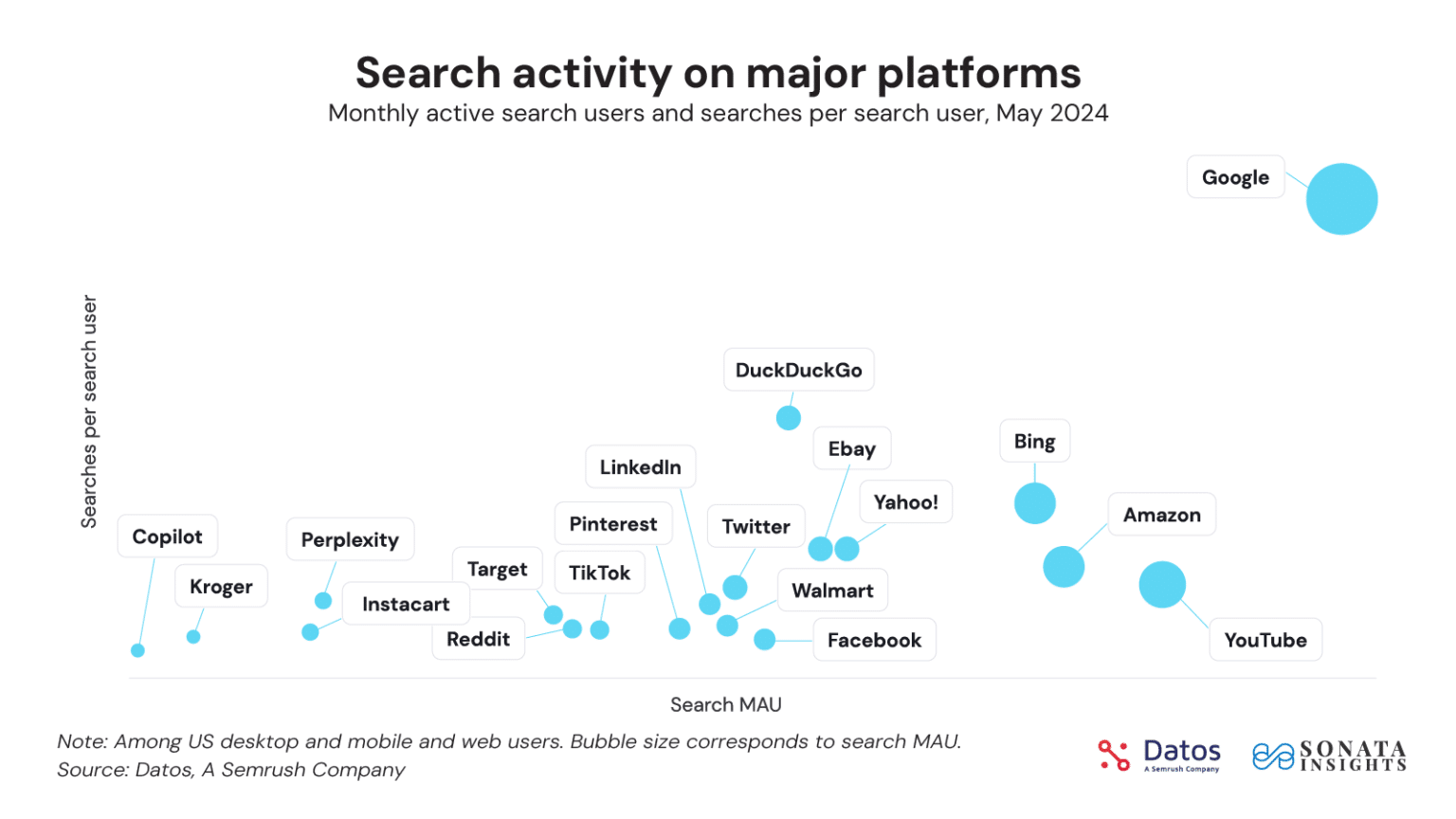
Are you upset that Google is ‘stealing’ your content to train their AI models?
The bad news: You can’t opt out of AI Overviews, as Google considers it a search feature.
The good news: You can block Google using the standard methods of noindexing your pages or using robots.txt. Bear in mind that this is a drastic measure, as it prevents Google from both showing your content in AI Overviews and the SERPs.
However, Google does provide an alternative method: ‘preview controls’, which are a way to tell Google not to provide a snippet in the SERPs or limit the amount of content that can be used.
Glenn Gabe ran an experiment to test whether Google would respect this.
The result? It did, but it took some time (and even a ping to Google’s John Mueller) for it to finally work. Regardless, it is an option if you want to opt out of AI Overviews.
Though there are ‘consequences’ (i.e. no search snippet), as Glenn Gabe discovered:
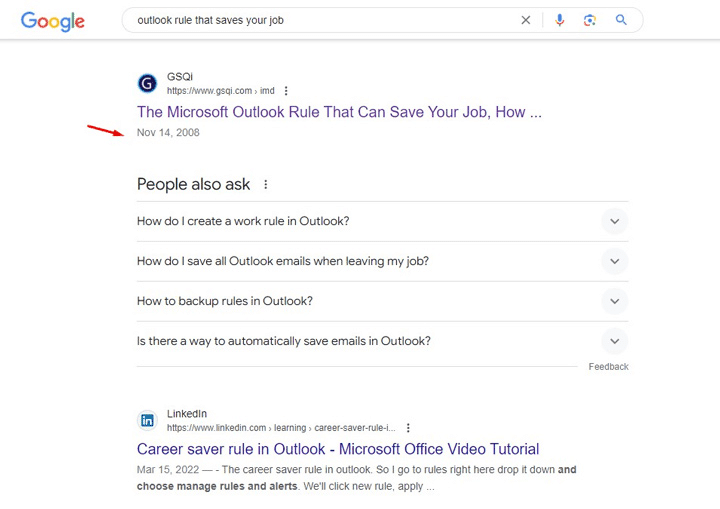
Ever since Google announced SGE, countless studies have been conducted to observe the impact AI Overviews had on the SERPs.
Here’s what we know so far:
- AI Overviews continue to be volatile — A study from BrightEdge showed that the visibility of AI Overviews increased to 12% in July, only for it to fall to 7% by the end of the month.
- Informational keywords were most likely to have AI Overviews — A study from Flow Agency showed that for HR and workforce management keywords, top-of-the-funnel (TOFU) keywords were the most likely to have AI Overviews appear (24%). Comparatively, transactional keywords had AIOs appear only 5% of the time. This is corroborated by research done by SEOClarity.
- You’re more likely to be linked in an AI Overview if you rank high for the query — A study by Rich Sanger and Authoritas showed that 46.3% of the documents linked in the summaries were from the top organic search results for the exact match query. When related queries were added to the direct match queries, the percentage of links from both the direct match and related queries in the top search results increased to 60.4%. It also showed that a link ranked first has a 53% chance of being featured, while content ranked tenth has a 36.9% chance. This is in contrast to what we saw in January 2024, where Google often showed sources outside the top 10 search results.
Unfortunately for all of us, Google will not distinguish between AI Overviews and organic search in Google Search Console. They will lump all the impressions and clicks together.
So, if you’d like to track the visibility of AI Overviews for important queries, you’ll have to use third-party tools like ZipTie.
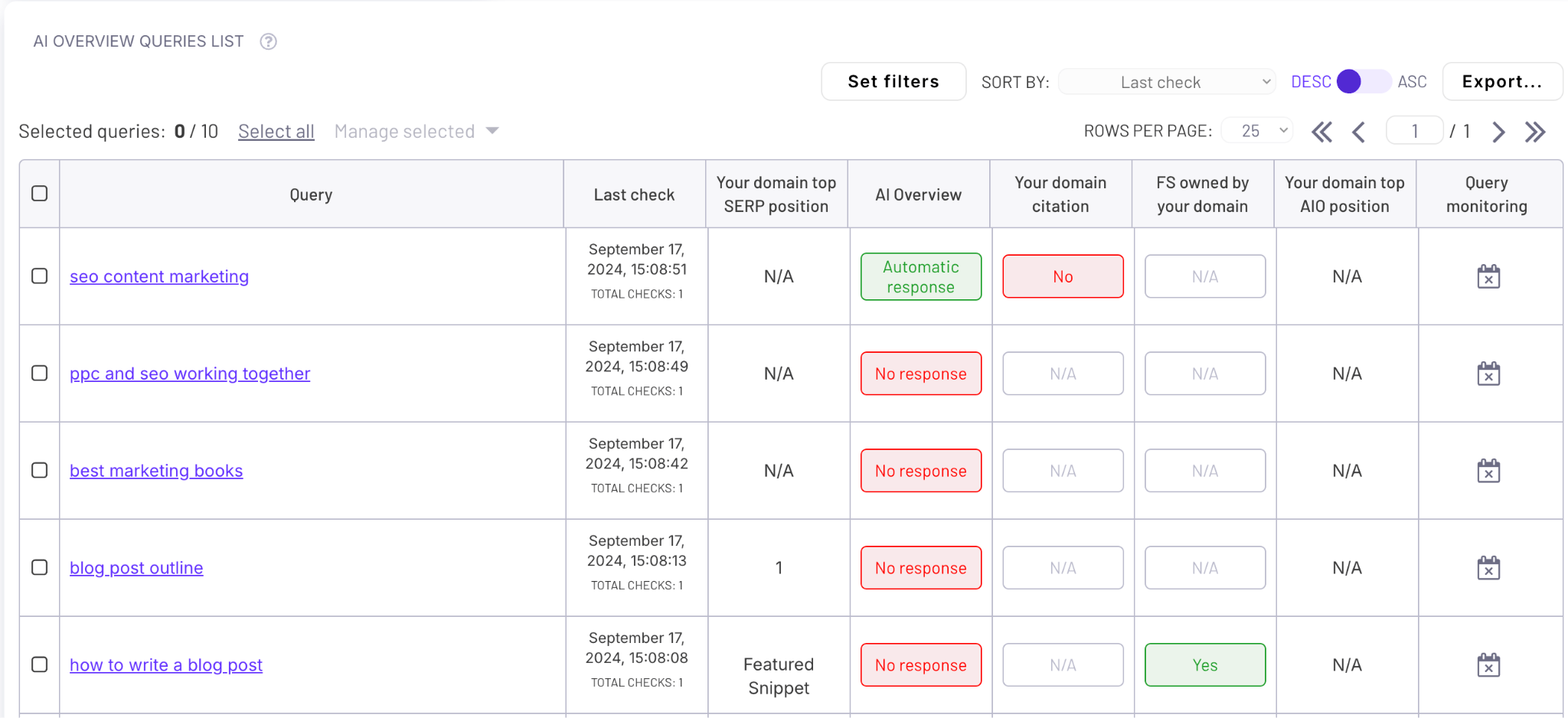
Bear in mind that AI Overviews are still volatile, appearing and disappearing for different keywords. Third-party tools may also struggle to keep up, considering that search queries will become more conversational and long-tailed.
Finally, the purpose of AI Overviews is to provide personalized summaries. This element will be missing when it comes to tracking, especially regarding linked sources.
Sidenote.
We’re working on tracking AI Overviews in Ahrefs. Stay tuned for updates!
Considering that Google seems to be aligning AI Overviews with organic results, your best bet is to continue following SEO best practices and aim to rank high on Google itself.
In fact, if we look at Rich Sanger’s recommendations from his latest study on AIOs, you’d find that it is essentially SEO basics:
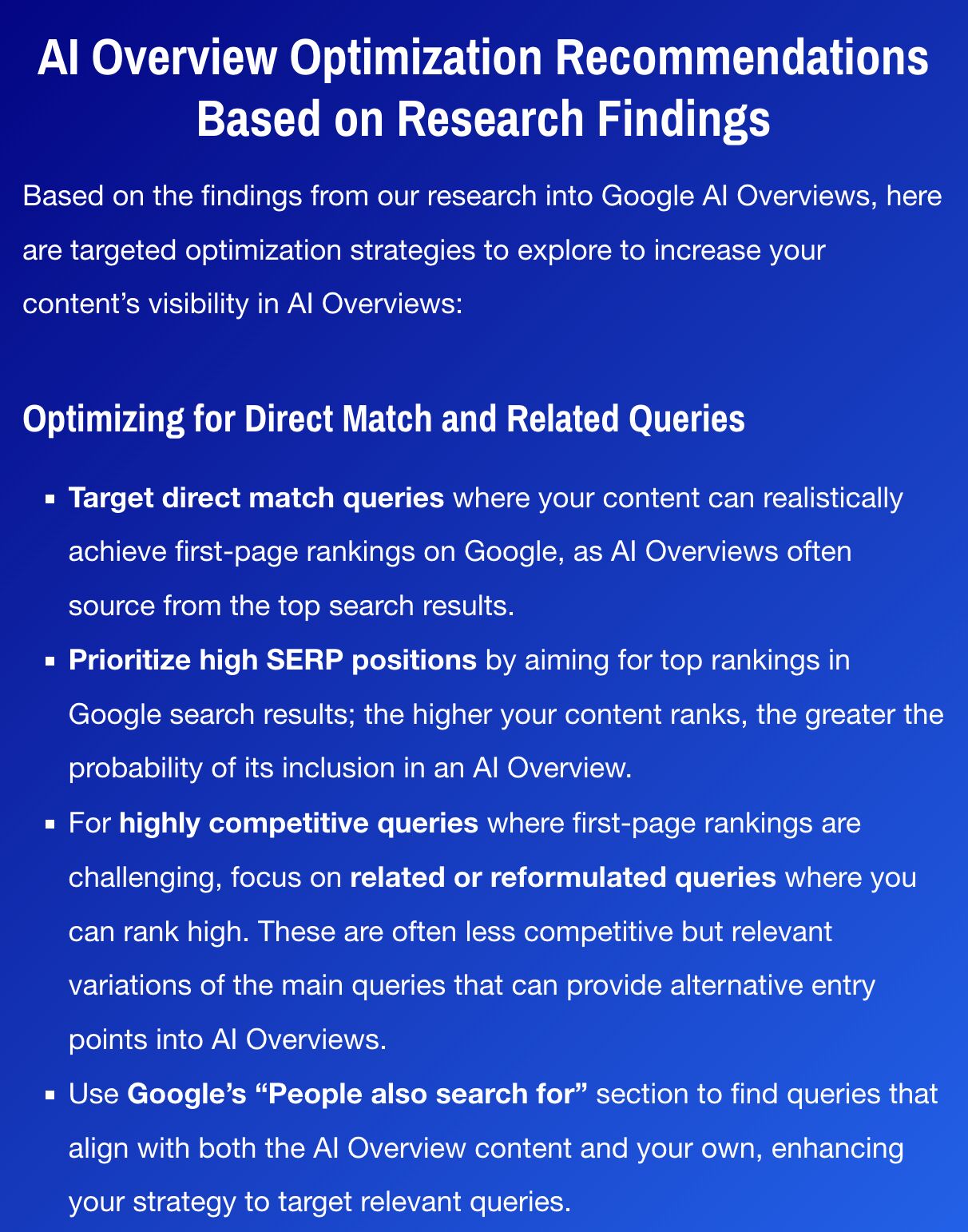
In short, even though Google has now introduced AI Overviews, the fundamentals of SEO are still the same. You need to:
- Do keyword research
- Make content users want to see by matching search intent
- Ensure the content is comprehensive and fulfills E-E-A-T
- Build links
However, given that the overlap is still not 100%, it could suggest a potential avenue for ‘information gain’ to be rewarded. To put it in layman’s terms, Google wants to reward new information, not copycat content.
In fact, when Rich Sanger analyzed the patent, it suggested that Google was indeed looking for diversity:
“But understand that the AI Overview doesn’t only provide documents from the top sources for that query. It seeks out diversity. If the top-ranked content for that query is homogenous, it will move on to closely related queries. Earning top page rankings along with visibility in the AI Overview for targeted queries is the best case scenario.”
How can you add ‘information gain’ to your content? There are three ways:
- Experimentation — Go into the real world, test ideas, and collect data that no one else has.
- Experience — Actually experience the thing you’re making content about.
- Effort — Go beyond others and make better things or things that are more than words on a page.
Our Director of Content Marketing Ryan Law expands on each concept in his article on standing out from AI content. I highly recommend reading it.
Final thoughts
This is everything we know about Google’s AI Overviews so far. It’s still a volatile feature, so expect many things to change as Google continues to experiment.
However, whether it’s organic search results or AI Overviews, good SEO doesn’t change. So, carry on with executing the fundamentals of SEO to perfection.
Did I miss anything? Let me know on X or LinkedIn.
Content Copyrights Belong to The Author. All Rights Reserved.
We're A Dallas Digital Marketing Agency That is Experts At Social Media Marketing, Website Design and Emarketing and Promotion.

